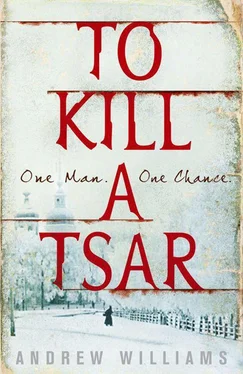‘Anna was there to report on what happened, that’s all,’ said Goldenberg reluctantly.
‘And Bronstein, how did you discover… ?’
‘The informer? I don’t know. That was Mikhailov. Mikhailov knows everything. He has his own sources. A man he calls the Director who he says guides him.’
‘And this man works for the police?’
Goldenberg shrugged: ‘I don’t know, but Mikhailov seems to know a lot about the police and the Third Section.’
Before Dobrshinsky could shape the next question there was an insistent knock at the door and a prison clerk entered unbidden bearing a note from the chief prosecutor.
Count Vyacheslav von Plehve had squeezed his ample frame behind the untidy desk in the assistant governor’s office. ‘This is in strict confidence, but I wanted you to know at once,’ he said, indicating with a wave of his plump hand that Dobrshinsky should take the chair opposite. ‘There are to be sweeping changes, a new Supreme Security Commission, and heads are to roll. I think it is certain General Drenteln will be replaced at the Third Section.’ The chief prosecutor placed his elbows on the desk, his fingers at his lips, a courtroom silence.
His news did not elicit a flicker of a response. Dobrshinsky resented being summoned from an interrogation to hear rumours of a new council, gossip about who was rising up the empire’s greasy pole and who was falling. His orders were to keep His Majesty alive. Service politics was a distraction.
The count may have had a sense of what he was thinking because he began to wriggle uncomfortably behind the desk.
‘The investigation,’ he said at last. ‘Are you any closer to arresting the leaders of this nihilist party?’
‘We have Kviatkovsky.’
‘Kviatkovsky?’
‘We took the plans for the Winter Palace from his flat,’ said Dobrshinsky.
‘The police have found nothing. They’ve searched the palace from top to bottom a dozen times, and all the neighbouring buildings,’ said von Plehve brusquely. ‘Every morning they check to see if any of the stones in the square have been lifted and they search the servants. If you’ve fresh evidence they will be overjoyed to hear it.’
‘The People’s Will may have called off the attack when they discovered we had Kviatkovsky in custody.’
Pushing his chair back sharply, the chief prosecutor rose and walked over to the tiled stove in the corner of the room and bent to the heat. ‘Anton Frankzevich, we need to demonstrate we are making progress to the chairman of the new Supreme Security Commission when he is appointed.’ He paused again, then said with quiet emphasis, ‘It’s important we make a good impression. Your future will depend upon it. Ah, you smile, but it’s true.’
‘I can say with confidence we are making progress,’ said Dobrshinsky.
‘What sort of progress? The Jew?’
‘I have persuaded him terror is slowing the pace of reform. That the emperor wants to introduce a democratic assembly and freedom of the press but he can’t be seen to bow to terror.’
‘And you think he believes you?’ asked the count.
‘Yes.’
‘Is he mad or simple?’
‘He thinks I’m a liberal and I can be trusted to tell the truth.’ Dobrshinsky paused, a thoughtful frown on his face. ‘He wants to believe he can play a role in shaping Russia. I’m trying to convince him that his part is in persuading his comrades to stop, that this is the only way to bring about reform. Oh, and I have assured him none of them will be harmed.’
‘So he’s a simpleton.’
‘Lonely, naive, weak, vain…’
‘So when can we look forward to…’
‘Arrests? I have names, descriptions, and we can tease more from him — more names and, I hope, some addresses. But these things take time,’ said Dobrshinsky. ‘We have a little way to go.’
‘Good, good, but not too much time,’ said the count with a resigned nod of the head. ‘Keep me informed. Now, if you will excuse me, I am expected at the ministry.’
The chief prosecutor had grasped the door handle and was on the point of stepping out when Dobrshinsky spoke again.
‘There is one thing more. Your friend, the English doctor, Dr Hadfield…’
The count interrupted him crossly. ‘He’s no more than an acquaintance. I met him at the British embassy. He made a very poor impression on me.’
‘Quite so, quite so,’ said Dobrshinsky. ‘Goldenberg remembers him well. He was at the woman Volkonsky’s.’
‘I see. So do you think he’s a spy?’ Von Plehve seemed excited by the possibility.
‘I can’t be sure. He lied to my officer. I’ve had him followed and he’s given my men the slip once or twice.’
‘Do as you see fit, but we don’t want a diplomatic incident with the British.’
For a time, Dobrshinsky remained in the assistant governor’s bare office, reflecting in a haze of cigarette smoke. What was it von Plehve had said? ‘Your future will depend upon making progress’. It had been impossible not to smile. No one was more adept at claiming credit and reapportioning blame than the chief prosecutor. A Supreme Security Commission would ask questions the count would have to answer, so it was important for him to be able to pass the responsibility for failure on to others. Vanity, ambition, fear came in so many guises. What was there of substance to distinguish the chief prosecutor in his immaculate ministry uniform from the helpless Jew in his prison greys? Goldenberg was naive, vain, despicable, but at least he believed in something. Dobrshinsky was almost sorry for him. He leant forward to grind his cigarette into an ashtray, a spiral of smoke still curling before him like a temple offering. Really, was stupidity the worst crime?
Taking headed paper from the pile on the desk and the pen from the silver stand, he wrote a short note, slipped it into an envelope and addressed it in a careful hand: Dr Frederick Hadfield, The Nikolaevsky Hospital .
‘See this is delivered at once,’ he said, dropping the letter in front of the assistant governor’s clerk as he left the office. It was time he met this English spy.
The first time Anna asked Hadfield for money he gave it without question. The second time, she told him she needed a little for clothes.
‘Of course, darling,’ he said, running his hand over her smooth skin and leaning forward to kiss her forehead. ‘How much?’
The third time he refused to give more. They were lying together on the old mattress, the diffuse light of a Sunday morning in January creeping into the makeshift bedroom, their conversation conducted in whispers lest they wake the old lady and her granddaughters.
‘You’re still wearing the same clothes,’ he said.
Anna was lying on her back staring at the ceiling, but even in the dim light he saw her face stiffen to a scowl.
‘Why are you wearing the same clothes?’
Ignoring his question, she gathered the sheet to her shoulder and turned to lie on her side with her back towards him. And at once he felt a pang of regret. How could he refuse her? It was money, nothing more. He reached out to stroke her hair. ‘Of course I’ll give you money. You don’t need to lie to me.’
She turned sharply to look at him, the sheet sliding from her chest. ‘What do you mean?’
‘Don’t tell me you want money for clothes. Don’t tell me anything.’
She blushed a little and her face softened. ‘No. I won’t.’ And she leant forward to kiss him tenderly, her fingers resting on his cheek.
But Anna did not ask for more money. She asked him to pay the party in kind. On the first occasion, he arrived home late one evening to a note urging him to ‘come at once’ to the Ekaterininsky Embankment. A ‘friend’ was in great need of medical care. The dvornik’s brain was too fuddled with alcohol to be sure when the note had been delivered.
Читать дальше












